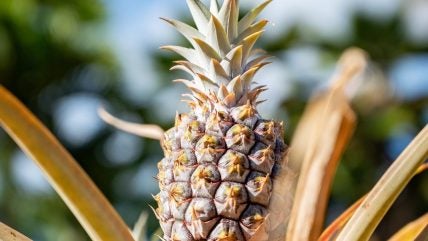
Dole said it is “well placed” to deal with any disruption from the El Niño weather event as the fruit and vegetables supplier tweaked its profit guidance.
The Dublin-based business also shrugged off any potential “material impact” on supply from the heatwave in Europe as Dole said adjusted EBITDA for the full year will be “at least” $350m.

Discover B2B Marketing That Performs
Combine business intelligence and editorial excellence to reach engaged professionals across 36 leading media platforms.
That metric rose 9.7% in the second quarter to 30 June to $122.7m and was up 9.5% year-to-date at $223.1m. Presenting results in May for the opening three months of the year, Dole said it “continued to expect to deliver” the $350m in EBITDA.
Discussing the latest numbers yesterday (17 August), Dole CEO Rory Byrne batted away any impact on production from El Niño. “With the onset of the El Niño climatic conditions, there is the potential for disruption in many of our key growing regions in Central and South America in the second half of ‘23 and into 2024.
“However, we are monitoring the changing weather patterns closely and believe we’re well placed to deal with potential challenges using our diverse sourcing network and indeed due to our advanced farming practices.”
Dole chief operating officer Johan Linden explained the context during the Q&A session with analysts, noting the previous El Niño events in the 1990s and in 2015/16.

US Tariffs are shifting - will you react or anticipate?
Don’t let policy changes catch you off guard. Stay proactive with real-time data and expert analysis.
By GlobalData“Historically, the biggest impact has been within our banana segment, and you will have rains in Ecuador and you will basically have droughts in the other places. In the end of the ‘90s, overall volumes in Ecuador came down 8% because of the rains.
“What has happened since then, at least if we looked at ourselves, is that we have a very experienced, the best team in the industry, they lived through already what happened in the late ‘90s.”
He added: “We have prepared when it comes to drainage, we have ag practices, so that we feel that we are in a very good position to handle what might come at us.
“Also, when you look at the dry areas, we have more irrigation in place and also different ag practices than we had then. So we don‘t believe the impact will be as big as it was in the late ‘90s.”
Linden also defended the margin position, as the adjusted EBITDA margin rose 20 basis points in the second quarter to 5.7%. Revenue was up 4.4% at $2.1bn.
“The beauty for us is, that if the worst comes to pass and there is a very dramatic decrease in volumes, we have a diversification both when it comes to our sourcing network and how our shipping is set up that we will be able to handle that better than the industry in general,” Linden said.
“We don‘t believe it will have a big hit if it comes to that for us.”
CEO Byrne also addressed the recent heatwave in Europe that resulted in wildfires in some countries when questioned on any potential impact on Dole.
“We don‘t think the heatwave is going to have a material impact on us. It will affect some categories of supply in northern Europe [or] coming out of southern Europe, in particular, the temperatures in Spain, southern Spain. We‘re not expecting that to have [a] material impact on us,” he said.
Byrne said Dole has navigated through the inflation-induced and Ukraine-driven challenges of 2022 in Europe when the business “could not quickly pass on significant cost increases to customers due to instability in the marketplace”.
He added: “We are pleased with a healthier supply and demand balance in the first half of the year as both allowed for a better pricing environment in Europe and much-improved selling conditions in non-core markets.
“However, it remains a challenge to continue to push pricing further to offset some of the inflationary pressures we have based in Europe.”
The market environment does remains “volatile”, he said, although Dole is seeing “continuing signs of inflation moderating”.





